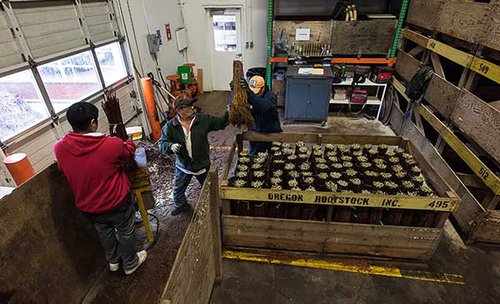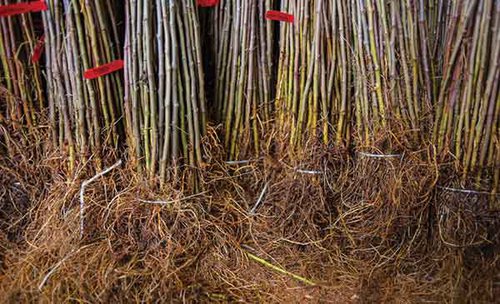Virus Certified
PRO-TECH Your Future

It’s our comprehensive root care system that ensures the virus-tested quality of our rootstocks. Before 1930, few of the viruses that affect deciduous fruit trees were known. Since then, over 50 viruses and virus-like diseases caused by mycoplasms have been discovered and isolated. Some of these viruses and mycoplasms can infect and kill a mature tree in one or two years!...wiping out years of work and considerable expense.
To ensure a healthy orchard, it is important to choose healthy, virus certified rootstocks.
For more than forty years, TRECO® has utilized the most advanced scientific research, carefully controlled growing conditions and the most efficient cultivation techniques to produce virus certified rootstocks of the very highest quality. As a result, our rootstocks are produced according to the rules and qualify for the Oregon Certified Nursery Stock tag, and are sold as a product of this program.
Certification is an annual process, including visual inspection and testing by the Oregon State Department of Agriculture during the growing season. Each rootstock variety is then registered with the state and is periodically re-indexed to maintain its virus-tested certification. At TRECO®, the system we use to maintain the virus-tested quality of our rootstocks is called PRO-TECH. It is a comprehensive root care system that is your guarantee that our rootstocks are certified by the Oregon State Department of Agriculture to be the best you can buy. A 2% fee on every rootstock sold is used to fund this program along with other research programs, to provide the highest quality nursery stock available. PRO-TECH Your Future.

Viruses that cause rootstock diseases are a serious concern for everyone involved in the orchard industry. These diseases can be caused by a single virus or virus-like agent, as well as by a combination of viruses. In recent years, certification programs have been very useful in reducing the incidence of harmful viruses, and new techniques for early virus detection are proving to be more effective as well. The use of virus-indexed stock that are known to be free of known viruses and subsequently re-tested for the presence of so-called canary viruses prior to distribution is an important initial step toward providing the best stock available.
Monitoring by visual inspection, together with specific field and laboratory testing, is another crucial step. Laboratory tests have improved tremendously in the past decade as new molecular diagnostic techniques have been developed. These new molecular techniques, including PCR and deep sequencing, are used to verify initial mother plants (or G1 material) are free of all known viruses. Cuttings from these mother plants, once established, become G2 plants within the nursery and become the basis for all certified plants produced within the nursery. G2 plants are tested for canary viruses, common viruses that can be pollen or otherwise carried into certified blocks. The most cost-effective test for these canary viruses in a nursery’s certified blocks remains the enzyme-linked immunosorbent assay (ELISA) test. This test can quickly and accurately detect canary viruses in infected plants in as little as two days and meets the international phytosanitary certification standards of Canada and other states.
